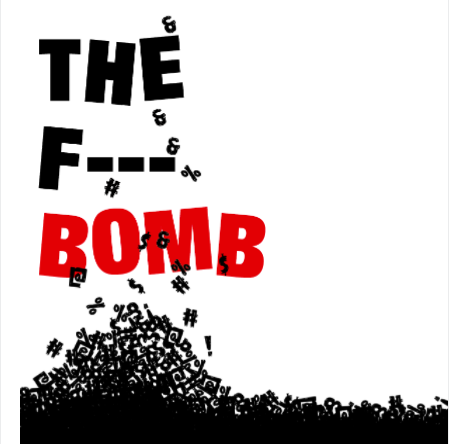The f— bomb: what students and teachers think about swearing in school
Teachers and students explore swearing at school

Graphic by Claire Yang and Zara Iqbal
September 13, 2017
“F—.”
“B—-.”
“Bull—-.”
“A–.”
These words can be heard echoing around campus, popping unceremoniously out of both students’ and teachers’ mouths.
“Holy s—.”
There goes one.
“F— yeah, dude.”
There goes another.
But are these words acceptable, especially in an educational environment?
Sophomore Andy Zhang thinks that it’s unrealistic for teachers to expect students not to swear as they might break the rule themselves. He believes that swearing is conditionally appropriate, for example when one is under pressure.
“I started [swearing] in eighth grade and I did it as the stress increased in my life,” Zhang said. “I’ll swear when I’m frustrated, but I’ll talk normally when I’m not.”
Similarly to Zhang, freshman Anura Ghodke started swearing in eighth grade. However, after reflecting on her choices, she thinks the words may have a larger effect than others realize.
“I didn’t [swear] to be cool or fit in or anything, but it just kind of started influencing my language,” Ghodke said. “I realized that they are words, but they do have some connotation, and may create a negative environment.”
Ghodke mentions that some of her friends tend to distance themselves from others who swear often. For students who don’t feel comfortable swearing, it may create an unfriendly environment.
According to a survey of 395 MVHS students, 35 percent say they swear often.
Senior Siddesh Shankar uses swear words in everyday conversation to communicate stronger feelings. He has heard teachers swear in class before, and thinks it can be beneficial in relaying something specific.
“It just makes it easier sometimes to make a point,” Shankar said. “I don’t mind the language. I think sometimes it does affect [my opinion of the teachers who use swear words] positively more than negatively.”
Even though math teacher Katie Collins allows swearing to express positivity, or frustration, she is strongly against cursing used against others. Collins believes that there’s potential hostility when choosing to express anger using curse words, because those emotions may allow people to lose control.
“Where swearing I think is really an issue is when we choose to use swear words in extremes of negative situations […] where someone might turn to someone and be like, ‘You’re a s— head,’” Collins said. “Now we’re using language to demean [or] hurt someone else, and that’s unacceptable. The use of the word s— now becomes an emphasis on extremism of making a point, to go out of the way to hurt someone else.”
On the other hand, Ghodke thinks teachers should be cautious about swearing in the classroom.
“I’d be shocked, honestly, [if one of my teachers swore in class], because they’re supposed to be an example for the students and they shouldn’t be swearing,” Ghodke said. “I probably would still take them seriously, because at the end of the day, they still are my teachers, but I’d look at them in a different way.”
English teacher Jireh Tanabe claims that it’s rare for her to swear in her classroom, and when she does, the reason has to be serious. However, she does indicate that swearing isn’t always used negatively, and can be a form of self expression, especially in literature.
“I think part of it is creative expression and not just cuss to cuss,” Tanabe said. “I think words have their places in how we express ourselves, or how we want our characters, or how we want our expressions to be, so in that context, it’s understandable.”
Like Tanabe, Collins thinks that swearing is condonable when it comes to expressing certain emotions. Collins swears in the classroom while expressing excitement, and in her experiences, specifically after solving a challenging math problem.
“When I have a kid that is doing a math problem, and they’re really excited and they finally get to the answer, […] they go, ‘F— yeah!’ [and] I’m like, ‘Yeah! F— yeah!’” Collins said. “Because it’s cool! And sometimes swear words are the best demonstration of extremism.”
On the contrary, Tanabe says that if she catches students swearing excessively, she’ll call them out on it, but she also believes that it ultimately depends on self expression and the person’s own judgement.
“Certainly, saying explicatives every other word of the end of every sentence is not called for,” Tanabe said. “But if there’s something you’re really trying to express, let’s say you’re really angry or you’re really upset about something, then it’s something you have to gauge, whether or not it’s appropriate to use.”
Shankar uses swear words commonly in his friend groups, but is very cautious with his words around teachers. Since most of his teachers have strict rules about swearing, he is afraid of the consequences that come with breaking those rules.
“I think that adults don’t really like [it]when kids swear,” Shankar said. “I feel like when they were growing up, they didn’t use that kind of language, but that’s what they tell us, at least, so I feel like they don’t really want to promote that.”
On the other hand, Zhang says that when he lets out a swear word by accident, his teachers don’t make it a big deal, because they swear on occasion well. He thinks when teachers swear in class, it doesn’t make them less qualified of a teacher.
“I think sometimes [when teachers swear] it’s pretty funny, and I understand them from where I come from,” Zhang said. “But as long as they don’t do it in abundance, it’s alright. It makes them more human. It shows that they have flaws as well.”
While Zhang doesn’t think that a teacher swearing is necessarily a bad thing, he also says that using explicit words excessively can interfere with students’ mood in class and prevent them from absorbing the material well.
However, Collins gives students great words of encouragement, especially when they’re struggling, even if they sometimes contain a swear word. She’s sure that her enthusiasm for math won’t make her out to be a bad person, but just as someone who loves math with a passion.
“We should be careful to not summarily dismiss people as good or bad because they use swear words,” Collins said, “Again, it should go back to the heart of your intention and use of your language and your behavior, at the end of the day.”

















